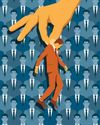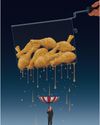
You rarely hear the words "emotion" and "strategy" in the same breath.
There's a reason for that: Emotions, especially in popular culture, are believed to be messy and subjective. Strategic planning, on the other hand, is driven by cold logic. It's why we have data and objective analysis, right? It's why strategy consulting has become a multibillion-dollar market, run by disassociated wonks trained in clinical processes.
However, this is a simplistic and naïve way of thinking. Breakthrough research from neuroscientist Lisa Feldman Barrett, a distinguished professor of psychology at Northeastern University, has shown that emotions are essentially forecasts that your brain produces as "shortcuts" based on your past experiences. That includes those in business. According to Barrett, emotions are one of the brain's ways of making sense of a world that would otherwise overwhelm it. By creating these shortcuts, we don't have to process information as if it's new every time-which means we save on reaction time and increase our ability to survive.
So what does this have to do with business strategy? Well, strategy formulation-just like emotion-is also based on a set of forecasts. You are doing what you believe to be best for your company, based on whatever you've experienced before. This means that whenever you embark on a strategy development process, you are in effect embarking on an emotional journey as much as an intellectual one.
Esta historia es de la edición Startups June 2022 de Entrepreneur magazine.
Comience su prueba gratuita de Magzter GOLD de 7 días para acceder a miles de historias premium seleccionadas y a más de 9,000 revistas y periódicos.
Ya eres suscriptor ? Conectar
Esta historia es de la edición Startups June 2022 de Entrepreneur magazine.
Comience su prueba gratuita de Magzter GOLD de 7 días para acceder a miles de historias premium seleccionadas y a más de 9,000 revistas y periódicos.
Ya eres suscriptor? Conectar

Chords of Success
For Saahil Goel, the deep-rooted passion for playing the guitar dates back to his high school days. Influenced by legends like Pink Floyd, Led Zeppelin, and the Pakistani band Strings, his musical journey mirrors his leadership style-balancing focus, discipline, and a collaborative spirit. Goel feels that playing guitar has enhanced his ability to balance focus and teamwork as a founder of an eCommerce shipping start-up.

IS YOUR RENT TOO DAMN HIGH?
Many small business owners struggle with their rents. Here's what to do.

HOW TO BOUNCE BACK FROM A BAD REVIEW
A one-star review can hurt your ego - and your business. But it's possible to prevent (and remedy!) this scary scenario.

HOW TO HIRE FOR THE FUTURE
Small businesses are struggling to find quality labor. So flip the conversation: Show workers how your business will set them up for opportunity.

You Can Hire Like Netflix
The streaming platform built an incredible team with a strategy called “talent density.” But you don’t need to be a tech giant to do it.

Speedy Growth Killed My Startup
We seemed to be rocking it - lots of press, major partnerships. Then we learned the harsh consequences of overlooking our customers.

Three Pivots to $100 Million
How do you find a working business model? Do it like Rowan-a brand that reinvented itself many times before finally piercing the ear-piercing market.

What Goals Actually Matter?
Some benchmarks are more important than others so what should you really care about? We asked six founders for their hardest-won lessons.

'Only the Strongest Are Going to Survive'
Brian Lee cofounded companies like LegalZoom and ShoeDazzle-and he believes a lot of conventional business wisdom is backward. Sure, it's harder to raise capital. But it's actually cheaper than ever to start a company.

HOW TRUST SAVED KFC
The former CEO of Yum! Brands explains how he turned around a struggling KFC-and the important lesson it offers for anyone in franchising.